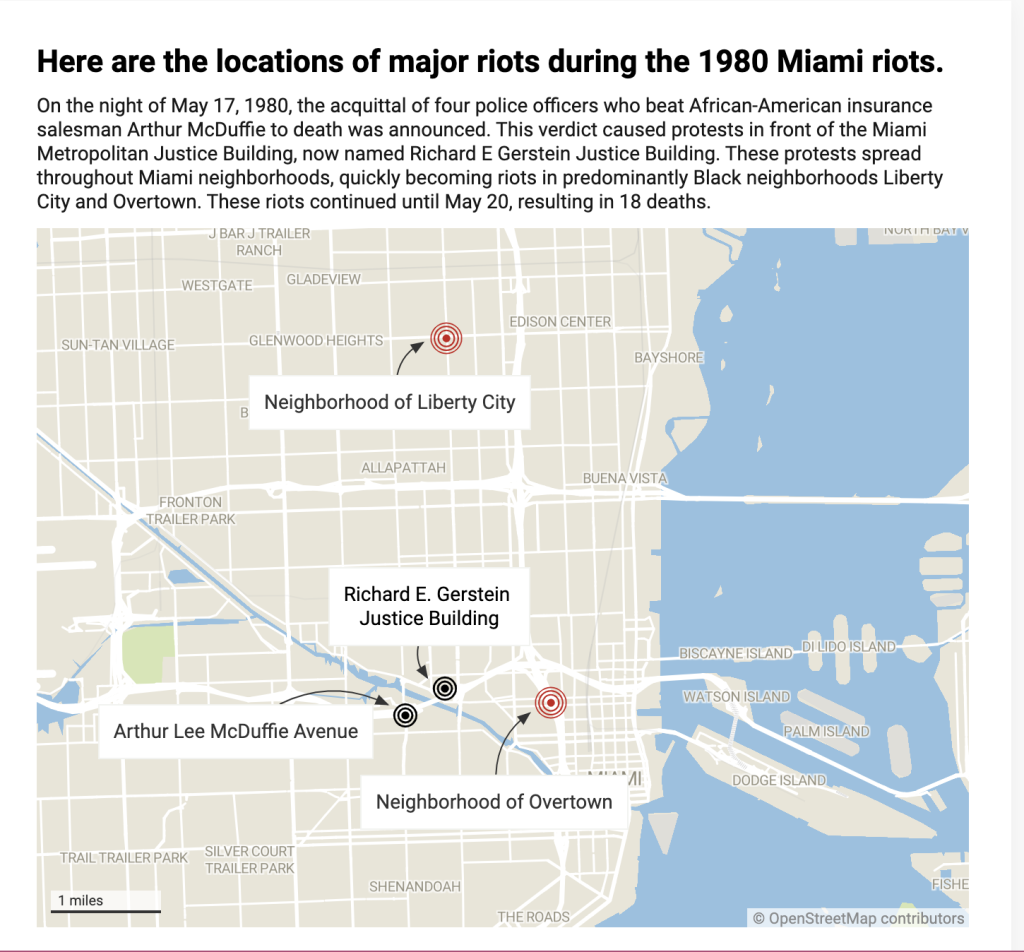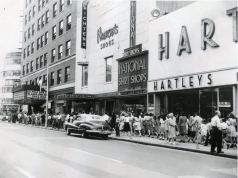Arthur McDuffie is a name people today probably won’t recognize, but the impact his murder left on the Miami area is insurmountable. McDuffie was a Marine Corps veteran, a father, a husband, and a salesman. On Dec. 17, 1979, he was pursued by police after running a red light on his motorcycle. Instead of reprimanding McDuffie for this, the officers resorted to brutally beating McDuffie. The officers also attempted to cover up the beating, by hitting McDuffie’s motorcycle with their nightsticks and the sergeant on duty telling the other officers to report this as a motorcycle accident to police and medical personnel.
McDuffie died of his injuries four days later on Dec. 21, just before Christmas. An investigation was later started into the officers involved with McDuffie’s “accident.” Foul play was discovered and the officers went to trial for charges such as manslaughter, battery, accessory, and evidence tampering. Five months later on May 17, 1980, an all-white jury acquitted four officers of any wrongdoing.
This verdict elicited a response in Black communities in Miami. A protest at the Downtown Miami Metro Justice Building following the verdict turned into a riot. The next day, the riots moved into predominantly African-American neighborhoods of Overtown and Liberty City. Over the next three days, Miami was in a state of emergency. The governor at the time, Bob Graham, called in thousands of National Guardsmen. Drivers were attacked with stones, and fires and looting occurred. On the third day, a curfew was imposed from 8:00 a.m. to 6:00 p.m. and the sale of firearms and liquor was temporarily banned. In total, 18 people were killed, 370 were injured, 787 were arrested, and property damage was estimated to be over $100 million.
Click here for a graphic on locations of major riots during the 1980 Miami riots:



Since the 1980s, changes in social and political movements to combat police brutality have occurred, such as the Black Lives Matter movement in 2013. Following the acquittal of George Zimmerman in 2013, the Black Lives Matter movement was loosely formed, starting as a hashtag on Twitter. In 2014, following the deaths of teenager Michael Brown and Eric Garner, leading to protests in Ferguson, Missouri and New York City, the movement and its message to stop police brutality against Black people became widespread. Since then, overall civil unrest following incidents of police brutality has reached a boiling point at the national level twice in the span of 5 years, once in 2016 following the deaths of Alton Sterling and Philando Castile and later in 2020 starting with the death of George Floyd.
With increasing outrage of police brutality, the issue has not slowed down. The United States has continued to see a rapid increase of (reported) cases of police brutality. According to Mapping Police Violence, an organization dedicated to report data on all police-involved killings in the U.S., 1,140 people were killed by police, the second highest number of police-involved killings in the past 10 years. Mapping Police Violence has also reported from their findings that in police killings, Black victims were killed at a disproportionate percentage when being unarmed and appearing unthreatening, compared to white and Hispanic victims, with 41% of unarmed victims being Black and 39% of “unarmed and not alleged to be threatening” victims being Black. Data visualized by security.org also reports that at the state level, “the rate at which police kill Black people is far higher than the rate at which they kill white people.”
In 2003, Northwest 17th Avenue in Miami, an epicenter of chaos during the riots, was declared to be renamed “Arthur Lee McDuffie Avenue.” In 2020, Miami-Dade County declared February 2nd as “Arthur Lee McDuffie Family Day.” These commemorations show that 40 years after his unjust death, Arthur McDuffie has become immortalized in the Miami area, forever remembered as an innocent life taken by police violence.
































